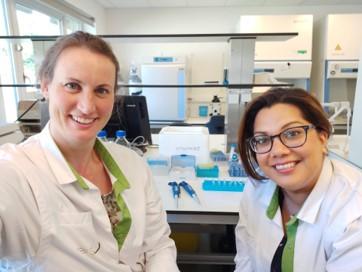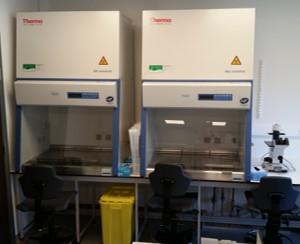Overview
The Skin Immunology & Immune Tolerance (SKIN) research group is part of the clinical Department of Dermatology at UZ Brussel. The clinical research projects include industry sponsored clinical trials of inflammatory skin diseases, academic studies on HPV-infection, psycho-dermatology, skin cancer imaging technologies, skin ageing & esthetics, wound healing & scar treatment, as well as improvement of our clinical performance, process standardization, PREMs and teledermatology.
The SKIN-lab at the VUB Health campus investigates the underlying immune-mechanisms of inflammatory skin diseases at the cellular level, including atopic dermatitis, rare skin diseases and connective tissue diseases, such as scleroderma or dermatomyositis. Our main interest is the overlap of allergic inflammation to autoimmunity in the context of atopic dermatitis and comorbid diseases (food allergy, asthma and rhinitis). Further, skin cells (primary human epidermal keratinocytes and dermal fibroblasts) are cultivated in our lab and used to establish atopic dermatitis-like human 3D skin models to study the neutralizing effects of novel treatments. Also, we focus on the skin barrier function measurements. In collaboration with the FRIA Research Group (https://fria.research.vub.be), we perform a study on the positive effects of strength training on immunosenescence.
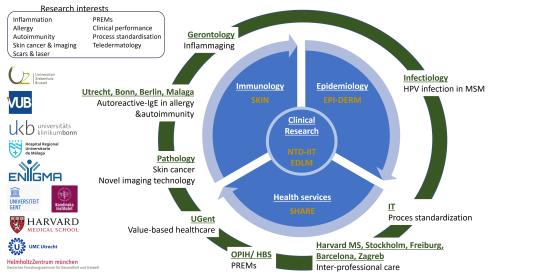
Allergy & Clinical Immunology
Pathophysiology of autoreactivity in atopic dermatitis
Atopic dermatitis (AD) is a chronic inflammation of the skin that affects ca. 20% of the children and 3% of the adults. The pathophysiology of AD is a complex interaction of environment, genetic predisposition, skin barrier, and T - and B cell mediated immune responses. Increased understanding of the disease endotypes may increase the disease management. However, disease endotyping in AD is just beginning to develop. A combined allergic-autoimmune endotype has been proposed with the presence of autoreactive IgE and autoreactive T cells directed to skin epitopes. Autoreactive IgE antibodies have been found in adults with severe and chronic AD, suggesting a progression from a Th2 mediated immune response to an autoimmune process against the skin, which may contribute to the disease severity and chronicity. In a previous study, we could show that about 50% of healthy children show IgE-autoreactivity, whereas in adults, auto-IgE is a finding almost exclusively in patients with AD. Currently we further investigate on this and we aim to characterize the patients with autoreactive antibodies and we investigate the clinical relevance and cellular pathways of autoreactive IgE-antibodies in the pathophysiology of AD.
Connective tissue diseases
Dermatomyositis (DM) is disorder of the connective tissue, which is characterized by purple-red eruptions and thickened hyperkeratotic papules on sun exposed sites, ragged cuticles and periungual dilated capillary loops. Patients with DM have an increased risk of comorbid disorders that can include weakness of the muscles, autoimmune disorders, dysphagia, respiratory diseases, cardiac diseases etc.
Autoreactive antibodies are often present and are either specific for myositis (myositis-specific autoantibodies (MSA)) or not directly related to DM (myositis-associatedd autoantibodies (MAA)).
There is accumulating evidence that IgE plays a role in autoimmunity. Auto-IgE has been found in several skin (related) diseases, such as atopic dermatitis, chronic urticaria and rheumatoid artritis. Whether autoreactive IgE antibodies are present in DM is unknown. In addition, the cellular targets and their clinical relevance still needs to be investigated.
Immunosenescence - counter mechanisms
Ageing is accompanied by decreased immunity and increased inflammatory responses (‘inflammaging’) inducing a chronic low-grade inflammatory profile (CLIP). Exercise increases both physical fitness and immunity, which can be beneficial for the elderly. However, resistance exercise (RE) is not often implemented as therapeutic strategy in the clinics.
The exercise-induced anti-inflammatory response is linked to exercise intensity and duration. Therefore, correct exercise training is essential to obtain proper effects. In the proposed project, we will compare different RE programs to investigate the effects of different training programs on inflammation in healthy older adults. Markers and genes involved in inflammation will be measured in peripheral blood and skin biopsies. We anticipate that the outcomes provide us an overview of important anti-inflammatory genes and that we can make a link between circulating and skin inflammatory markers. The proposed project is a step forward towards future application of RE in geriatric patients as additive therapy to accelerate their recovery and pathologies related to inflammation. In addition, if the use of skin biopsies shows to be an effective model for measurement of the anti-inflammatory response in the mucles, this will improve future studies as this is less invasive. The present project is based on a collaboration between the Department of Gerontology and Dermatology at the VUB.
Lasers for treatment of scars
Scars can develop after dermal injury, such as surgery, trauma and skin inflammation. Formation of scar tissue is characterized by inflammatory cells and increased proliferation of fibroblasts. Treatment of scars with lasers is still a relatively new treatment approach. Laser therapy decreases vasculatrization leading to tissue hypoxia which results in increased cell catabolism and reduced collagen production.
The combination of different lasers may improve the efficacy and lower the risk profile. In the present study, we aim to investigate the effect of combined laser therapy on the aesthetic outcomes. This study will be performed in collaboration with Uniklinikum in Aachen, Germany.
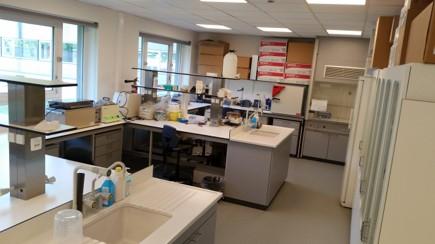
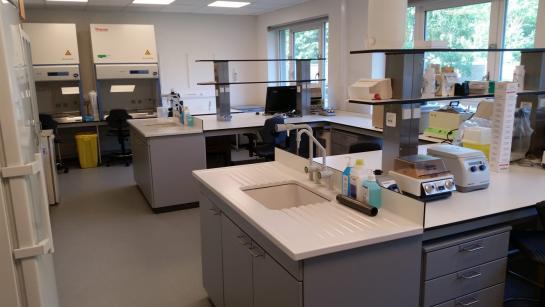
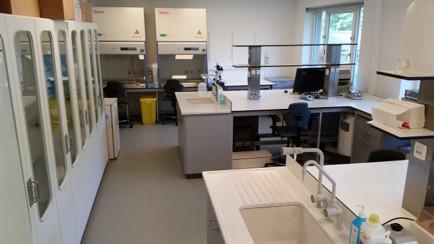
Epidemiology
HPV infections in men-having-sex-with-men (MSM)
HPV infections in MSM
Psychodermatology
Psychodermatology in patients with atopic dermatitis
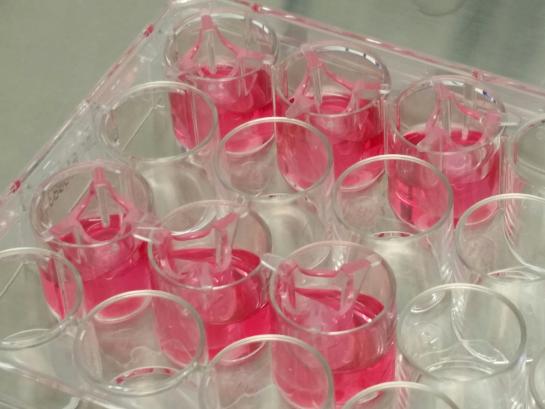
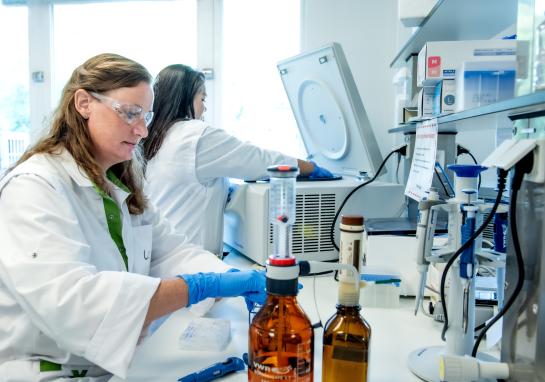
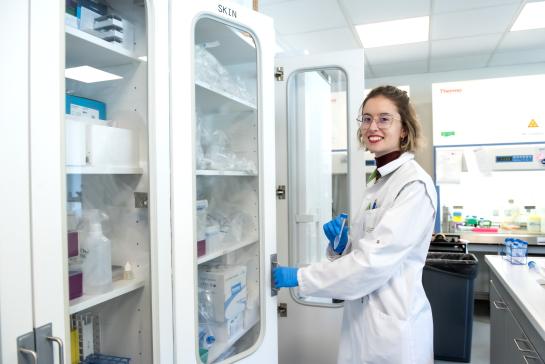
Health care management & services
Process standardization
Process standardization
PREMs
PREMs
Inter-professional care
Inter-professional care
Value-based health care
Value-based health care

